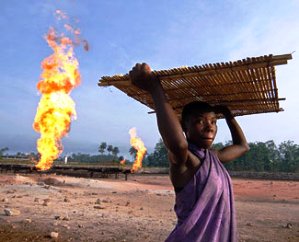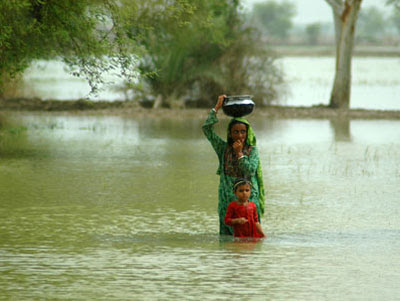climate change
Pakistan: Doob Gaya Hai -- a song for flood victims, by Laal (Red)

By Taimur Rahman
September 5, 2010 -- I am the main performer in this song. Laal (Red) is a communist band. My name is Taimur Rahman and I am also the general secretary of the Communist Mazdoor Kisan Party (Communist Workers and Peasants Party). This song is not produced for a particular organisation but just to raise awareness about the issue.
(Updated Sept. 8) Raj Patel: Food rebellion -- Mozambicans know which way the wind blows
Pakistan: As floods move south, calls for debt cancellation grow

September 2, 2010 -- Democracy Now! -- In Pakistan, torrential rains a month ago that triggered unprecedented floods have moved steadily from north to south, engulfing a fifth of the country. Seventeen million people have been affected, and some five million have lost their homes. Meanwhile, a movement to cancel Pakistan’s external debt is now underway as campaigners plan a protest in front of Pakistan’s parliament house today to call on international institutions like the IMF to cancel the country’s debt.
Guests:
Ian Angus: What next for ecosocialists?

By Ian Angus
August 30, 2010 -- Canadian Dimension via Climate & Capitalism -- Not long ago, most socialists had little to say about environmental issues, and the environmental movement was focused on individual (change your light bulbs) and capitalist (create a market for emissions) solutions to the ecological crisis.
In 2007, immediately after the founding of the Ecosocialist International Network, I wrote a Canadian Dimension article on the challenges facing ecosocialists. In it, I discussed two parallel trends that, though in their infancy, seemed to portend a new wave of anti-capitalist and pro-ecology action.
Some socialists were moving away from the left’s abstention from the environmental movement, and attempting to develop a distinctly socialist approach to the global environmental crisis.
Pakistan: Multi-party conference demands debt cancellation, launches mass movement to refuse debt


By Farooq Tariq
August 29, 2010 -- A multi-party conference in Lahore has decided to campaign for cancellation of Pakistan's crippling foreign debt and to organise mass rallies in Lahore, Karachi and Islamabad. The first rally will be on September 2 in Islamabad.
The Labour Relief Campaign in association with Oxfam Pakistan called the conference on August 29, in Lahore, to discuss the issue of debt repayment in the post-flood scenario. It was chaired by Aman Kariaper and Ammar Ali Jan. Senator Hasil Bezinjo vowed to take the issue to Pakistan's Senate and present a resolution to demand that government refuse to pay the foreign debt.
Rehabilitating utopia and saving the future
By Ben Courtice
August 29, 2010 -- Blind Carbon Copy [BCC] -- Socialism was conceived as a creative and idealistic movement, but lost its way for most of the 20th century. Recapturing this imaginative energy can help find solutions to such huge threats as climate change. This article started as a short impromptu speech I gave to launch the third edition of the Australian Socialist Alliance's Climate Charter.
* * *
Socialism used to be a rallying point for idealists, utopians, dreamers and those who were simply hopeful. It carried an almost millenarian promise of redemption and salvation. More importantly, it allowed its advocates to exercise their imagination. If socialism was to democratically realise the wishes of the common working people, why should they be restrained in their wishes?
Pakistan flood catastrophe: West gives `billions for killing, little for life'

By John Passant
August 15, 2010 -- The floods in Pakistan have threatened the lives and safety of more than 20 million people. Millions have lost everything. Now hunger and disease haunt the country. Dysentery and cholera are gaining a foothold as people without homes starve and kids without Western help die.
The US gives the Pakistan government US$1 billion a year to fight "militants". It has increased its flood aid contribution from $10 million to $25 million. That’s right. Its aid figures is millions, not billions.
That’s because for US imperialism cowering the world before its might is much more important than providing aid to people affected by the floods.
Is Africa still being looted? World Bank dodges its own research

By Patrick Bond
August 15, 2010 – The continent’s own elites, together with the West and now China, are still making Africans progressively poorer, thanks to the extraction of raw materials. Reinvestment is negligible and the prices, royalties and taxes paid are inadequate to compensate the wasting away of Africa’s natural wealth. Anti-extraction campaigns by (un)civil society are the only hope for a reversal of these neocolonial relations.
Though it’s easy to prove, even using the World Bank’s main study of natural resource economics, the looting allegation is controversial. When I made it during a Canadian Broadcasting Corporation (CBC) interview last week, the World Bank’s chief economist for Africa Shanta Devarajan, immediately contradicted me, claiming (twice) that I am not in command of the “facts”.
Karl Polanyi provides `a vital intellectual resource' for ecosocialists
To allow the market mechanism to be sole director of the fate of human beings and their natural environment, indeed, even of the amount and use of purchasing power, would result in the demolition of society. For the alleged commodity "labor power" cannot be shoved about, used indiscriminately, or even left unused, without affecting also the human individual who happens to be the bearer of this peculiar commodity. In disposing of a man's labor power the system would, incidentally, dispose of the physical, psychological, and moral entity "man" attached to that tag. Robbed of the protective covering of cultural institutions, human beings would perish from the effects of social exposure; they would die as the victims of acute social dislocation through vice, perversion, crime, and starvation. Nature would be reduced to its elements, neighborhoods and landscapes defiled, rivers polluted, military safety jeopardized, the power to produce food and raw materials destroyed -- from Karl Polanyi's The Great Transformation (1944)

